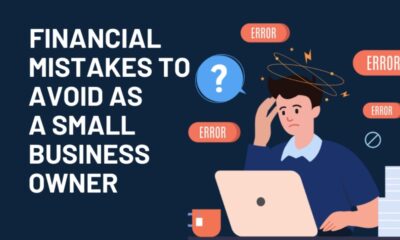Business
Most Important Personal Finance Tips for Freelancers Need to Know

If you’ve always wanted a flexible work schedule like that of a freelancer, keep in mind that this career path necessitates excellent financial management, both personally and professionally. These are the top 20 tips that any independent contractor or self-employed person should follow.
- Create a budget
This may sound like very basic advice, but everyone, including freelancers, should create a budget, even just to figure out how much you’ll need to pay your bills and buy necessities each month. The 50/20/30 strategy is recommended by many experts, which allocates 50% of your after-tax income to debts and savings, 20% to needs, and 30% to wants over needs.
- Keep your bank accounts apart
Create a different bank account specifically for your professional income and any other side projects you may have, such as Uber or Airbnb, to help you better manage the money related to your job. According to Nerd Wallet, keeping an eye on your business expenses will be simpler, and audits will be considerably less unpleasant.
- Put aside funds in a savings account for taxes
For freelancers, payday is a time to celebrate. It’s simple to overlook the fact that taxes will eventually be due on a portion of that payment. The portion of each payment that will be withheld for taxes should be set aside by freelancers. Invest your money in a high-yield savings account instead. In this manner, as you wait for your tax bill, you will earn interest on your savings.
- Make tax payments
Freelancers need to keep in mind that they are in charge of collecting taxes for their services. Set aside money as soon as payment is received to cover the sales tax that you will need to pay every quarter, according to Chartered Professional Accountants Canada.
- Establish a safety net
A safety net is essential because downturns can occur for a variety of reasons, including late payments, slow periods, and client loss. You can begin creating a financial cushion by renegotiating your mortgage to lower your payments, setting aside money from a second contract, and making budget revisions.
- Calculate an emergency fund
Freelancers need to save for a rainy day, but how much should they save? To ensure that you can pay for necessities, the majority of experts advise saving the equivalent of three to six months’ worth of income. In fact, some recommend waiting nine or even twelve months. Naturally, it’s best to save as much as possible!
- Develop your company
Working for yourself as a freelancer is not easy. You should consider expanding your business and making recurring investments to draw in new clients because losing a client suddenly can have a disastrous effect on your finances. Just watch out that it doesn’t take away from the caliber of your goods or services.
- Know the financial system in your area
You will be able to deduct some of your expenses as a freelancer. According to Chartered Professional Accountants Canada, this typically covers expenses for office supplies, training, banking fees, accounting and legal fees, and rent. To find out what you are entitled to under your local, state, and federal fiscal systems, visit government websites.
- Protect your earnings
Since your employer does not insure freelancers’ salaries, you are not covered if you become incapacitated—for example, after receiving a serious illness diagnosis, such as cancer, or suffering a disabling injury. Consider getting an insurance policy tailored to your specific circumstances, like critical illness or disability insurance.
- Review your health requirements
Freelancers do not have prescription insurance either. Medication coverage insurance might be necessary, depending on your health. A financial advice website called The Balance offers several solutions to this issue, including taking out private insurance, joining a professional association that provides insurance to its members, or getting coverage under your partner’s insurance.
- Pay off your debts as soon as possible
Having debt hanging over you is never a good thing, no matter what your profession. Paying off your debts as soon as possible is a good idea because freelancing can be precarious. This is especially true for debts with high interest rates.
- Examine programs that provide financial assistance
Various financial support programs can be offered by public and private organizations, particularly if you’re just starting or considering becoming a freelancer. Home Business advises spending some time researching your possibilities.
- Obtain work and possessions insurance
All Business suggests that getting professional liability insurance might be a good idea depending on the nature of your freelance work. Even though you signed a contract with a client, disagreements over interpretations could result in an expensive, uninsured legal dispute.
- Review your rates
Generally speaking, the cost of goods and services rises annually, which implies that your business’s overhead will also rise. The website FlexJobs, which offers remote and flexible jobs, suggests that you review your rates on a regular basis even though each increase might not show up in them.
- Manage your accounts
You have an obligation to handle your accounts as a freelancer. While paying your taxes, simplify your life by organizing yourself from the start. Store all official documents about your company or services, including invoices, carefully.
- Learn to say no
As Benjamin Franklin once said, “Time is money,” and freelancers in particular need to remember this. Learning how to politely refuse bad clients—those who are disrespectful, constantly ask for more without paying what is fair or are just plain rude—is essential. Make time instead for fresh, more beneficial client interactions.
- Invest to increase your income
It might be time to start assigning some of your work to an outside resource if your workflow is growing and you’re having trouble finding enough hours in the day. You could be more productive if you hired someone else to handle your accounting or rented a better workspace.
- Take into account requesting a deposit
As a freelancer, it is your responsibility to bill clients and collect payment. You will not be paid otherwise. Asking for a down payment is one way to guarantee payment. But not every kind of work calls for this, nor is it always suitable. The website Business advises looking into your options for recourse in the event of non-payment to determine whether this could be beneficial for your company.
- Make retirement plans
Making your own pension fund is part of being self-sufficient in the workplace. Make it a habit to put money aside for your pension fund as soon as possible, either on a regular basis or with each paycheck. If your business grows, you can always increase the amount you can afford, even if it’s only a small amount at first.
- Make smart financial decisions
Nothing is guaranteed when working for yourself or as a freelancer. Using your money sensibly is essential, according to Money Sense. Use your personal funds, for instance, neither to finance side projects nor to make purchases you are unsure you will use.
-

 Tech2 weeks ago
Tech2 weeks agoFrontier Galvanizing: The Critical Role Of Galvanizing In Renewable Energy And Utility Projects
-

 Business2 weeks ago
Business2 weeks agoRandy NG: Inside the Process of Managing End-to-End International Trade Operations
-

 Business3 weeks ago
Business3 weeks agoArdavon Moayer Explains How Discipline and Teamwork Translate to Sales Wins
-

 Education3 weeks ago
Education3 weeks agoForged in Fire: Nicholas Lawless Unveils Lawless Leadership – The Model Built for a World That Traditional Leadership Can’t Survive
-

 Cryptocurrency3 weeks ago
Cryptocurrency3 weeks agoRami Beracha Asks, Can Israel Become A Global Leader In Blockchain Innovation?
-

 Business3 weeks ago
Business3 weeks agoOPO Group LTD Strengthens Its Global Footprint With Expanding Offices and a Modernized Trading Ecosystem
-

 Travel6 days ago
Travel6 days agoMichael Hopkins, Denver: Rethinking the Airport Experience for Modern Travelers
-

 Tech1 week ago
Tech1 week agoAI Won’t Replace Storytelling: Nathalie Kyriakou On The Human Side Of Marketing






















